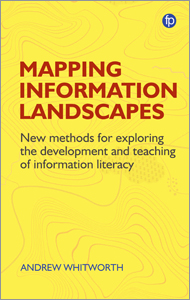
Primary tabs
You don't need to be an ALA Member to purchase from the ALA Store, but you'll be asked to create an online account/profile during the checkout to proceed. This Web Account is for both Members and non-Members.
If you are Tax-Exempt, please verify that your account is currently set up as exempt before placing your order, as our new fulfillment center will need current documentation. Learn how to verify here.
- Description
- Table of Contents
- About the author
- Reviews
This is the first book to study how the political content of information literacy (IL) arises from the way it has become defined and is taught. It introduces new methods for research into the development of information literacy in learners, and explores the implications of this research for the design of IL teaching, both in formal educational settings and in workplaces.
Power is not an inherently dominating thing, wielded only from ‘the top’ (governments, senior managers in organisations, etc.) and used to oppress. The idea that information literacy education can be empowering , giving those at ‘the bottom’ the power to investigate information practices and change them if necessary, is supported by the models of power emerging from the work of Michel Foucault. He sees power as being available, potentially, to all actors and agents in a given setting. This is view of power as something emerging from, and shaping, micro-level discourses, and which can generate capital, helping learners change their world and the practices that shape it.
To understand how such an approach can be empowering, the book explores how we can draw on difference in productive ways in IL education with a theory-led, empirical investigation of how the way information literacy is taught – whether formally or informally, and whether in schools, universities or workplaces – influences the development of information practices at the micro-level.
The book also draws on original research to provide a detailed account of how information practices emerge from communities of learners in different settings and how discursive mapping can be taught to learners. It also covers how the capacity to engage in it emerges from educational environments in a more indirect way, and how learners respond to and resist institutionalised power by developing their own capacity to stewarding their information landscapes and digital habitats.
1. Introduction: power, difference and information literacy
2. Previous work on information practice
3. IL education, phenomenography
4. The nature of power and difference
5. Difference and discursive mapping
6. Mapping in workplace learning: the Bibliotek i Endring (Changing Libraries) project
7. Mapping in university IL education
8. Discursive mapping via online discussion activities
9. Conclusion…Towards a xenophiliac IL education
Andrew Whitworth
Andrew Whitworth is Director of Teaching and Learning Strategy at the Manchester Institute of Education. He was previously a senior lecturer and Programme Director (and initiator) of the MA: Digital Technologies, Communication and Education at the University of Manchester. He was a keynote speaker at the 2017 European Conference on Information Literacy (ECIL2017) and is the author of Information Obesity (Chandos, 2009) and Radical Information Literacy (Chandos, 2014).
"Maps are fascinating, and they are beautiful objects too. This original and eclectic book places maps at its heart, explores them, manipulates them and transposes them so that they become guides and frames for the information landscapes which we all navigate in our daily lives. The author takes us on a roller-coaster journey through geographical space and time, taking us from Hereford Cathedral’s Mappa Mundi to the subtle symbolism of Australian Aboriginal maps to the mapping of concepts. It’s a fascinating read for anyone interested in the meaning and understanding of information."
— Stéphane Goldstein, Executive Director, InformAll


